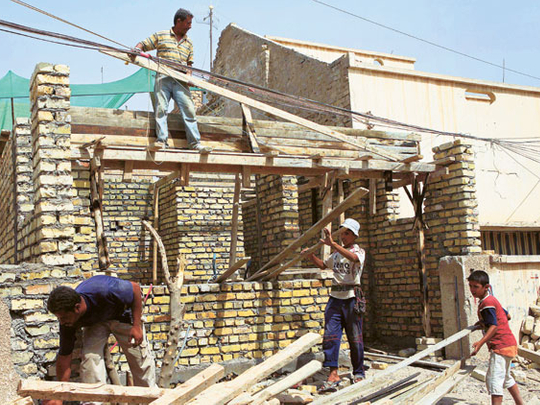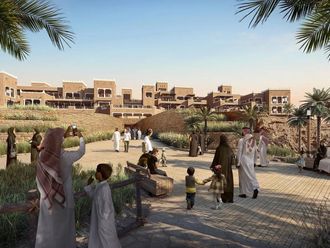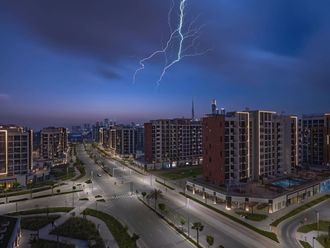
Dubai: The recent news from property consultancy CBRE that Iraq is the fastest growing construction market in the Middle East was no surprise given the dire need for housing, infrastucture and facilities after more than eight years of war.
Most recently, it was South Korean firms that were fortunate to have won major housing contracts in the country, including the construction of 100,000 units as part of a project involving 500,000 homes.
Faleh Al Ammiri, Undersecretary of the Iraqi Ministry of Housing and Construction, told Gulf News how plans for the country were progressing.
GULF NEWS: How can you be so ambitious about building housing when the infrastructure's main element, electricity, is not available? Buildings — as an example — require lifts, electric water pumps, etc. How can communities live without electricity?
Faleh Al Ammiri: Certainly, the implementation of these projects requires time during which infrastructure and providing the community with electricity will be completed. As for major investment projects, electric power stations will be built to provide such projects with electricity as well as water and sewage systems.
What about paving roads in Iraq, why are there so many projects in this area?
Road networks in Iraq were previously neglected and the whole system is out-of-date as it was overused by the army, but we now have plans to refurbish the system. A renovation of the roads network is currently underway. Weigh stations across the country's provinces were officially announced lately, as overloads are the main reasons behind the recent road damages. There is also the intent to carry out a highway connecting Umm Qasr with the Turkish border, along with other roads connecting the Iraqi cities. Construction of bridges is also part of the plan, however maintaining roads and bridges require users to abide by load limits, and the provinces need to carry out their commitments in this regard.
What about the housing fund in Iraq? What is the financier's role in the reconstruction process?
The housing fund is a lending establishment which offers easy loans for contracted and government employees who own land plots. The fund has granted tens of thousands of applicants who wish to build residential units or construct additional buildings besides the existing ones. The fund law allows investors to develop limited residential communities. The law awaits the Parliament's final endorsement and the increase of its capital to widely serve the Iraqi citizens.
What type of production factories are owned by the Ministry of Housing and Construction? How many of them have been built lately?
The ministry-run corporation has dozens of factories specialising in the production of concrete products including pipes, bridge pillars as well as asphalt, stone breakers and ready-mix factories, most of which were sabotaged after the downfall of the former regime in 2003. However, we have plans to renovate these factories and import new ones to meet the ever-increasing demand.
What is the ministry's agenda in implementing the National Housing Plan in Iraq?
The national housing project which has been approved by the supreme body for national housing is a governmental programme aimed at building appropriate housing units to be sold to Iraqi beneficiaries at cost price or less. Several units from the completed projects were given out to the new owners. Currently we have 30 projects under construction and more within the Ministry's future plans. Increasing the number of housing-related projects requires further financial allocations as well as land plots from the Ministries of Municipality and Finance as it is different from investment programmes.
What is the status of the projects currently?
We don't have stalled projects, as all impediments that caused a halt in the projects were surmounted thanks to the effective efforts of the Minister, engineer Mohammad Al Darraji. Tendering mechanism has also been amended taking into account the technical qualification of the companies which participate in the bids so as to limit the competition between qualified and financially backed companies capable of implementing the work.
What is the volume of foreign investment in the ministry's projects?
There are no foreign investments in the Ministry's current projects; however, a few new projects were given to foreign companies associated with Iraqi firms.
Are the largest investment companies American, Chinese or of other nationalities? Which of these companies invest most in Iraq?
None of them have invested with the Ministry's projects; however, South Korean firms are fortunate to have won major housing contracts including the construction of 100,000 units which is a part of a project to construct 500,000 residential units for which several foreign companies are competing.
How do you deal with companies that flee the country after handing over their contracts to other sub-contractors? Do you blacklist them? What about unimplemented and works done with less specifications, do you conduct a re-tendering process, or does the ministry spend the same money twice?
We have set a system which bans partial or total sale of referred contracts to other contractors. The law and tender terms and conditions also bans such acts, although some may manipulate using legal means, our technical and control teams as well as the resident engineer immediately deal with such manipulations. Furthermore, the law allows the companies to use qualified sub contractors upon approval of the project's owner.
The manipulation of Iraqi private companies is not worrying as it rarely occurs. As for the contractor who submits fake documents or fails to implement the work, a written warning will be sent and the work will be given to another qualified contractor. Violating contractors will be blacklisted and the contractor who fails to carry out the contract will pay the difference of the contract's value.
There is a lending plan for housing projects which has a shortage of about 2.5 million residential units, can you tell us about it?
Iraq lacks a clear lending policy, as features of integrated financial system in the country do not exist. Lending services are being provided in an (old fashioned mechanism) by the Real Estate Bank, Housing Fund and some private banks. We look forward to a time when the private banking system takes part in financing investment projects and the limited housing projects with the cooperation of the state's ministries which may develop residential units for its employees and other community members who meet the required housing criteria.
According to the required number of residential units, financial allocations will be needed for such projects. The government will not be able to unilaterally supply the needed funds, therefore enhancing the investment environment in Iraq that may attract investors will be required, especially as the housing sector is promising and Iraq is one of the largest housing markets in the region. Thus, the big challenge requires greater and stronger methods to face it, mainly in establishing clear and ambitious lending policies.
Has your Ministry benefitted from the ‘lease to own' proposal by Ahmad Chalabi, which called on the state to embark on the construction of residential units for all Iraqis during a five-year period? Do you think it is possible to provide all Iraqis with housing units? How long will this take?
Dr Chalabi's proposal does not intercept the ideas of our ministry in handling the housing crisis. He called to set up a housing commission for which a special budget is allocated to construct residential units by local or foreign investors and put them up for sale to citizens.
We discuss and develop all ideas conducive to help solving the housing problem. Within this context, the Ministry has launched a low cost residential project and embarked on inviting companies to present their designs.
This inspiring project will provide residential units for poor people who can't deal with investors. We hope that 1-2 per cent of the fiscal budget would be allocated for this project or help finance it on a long-term basis. It is one of the solutions proposed by the Ministry to partially solve the country's housing problem.












